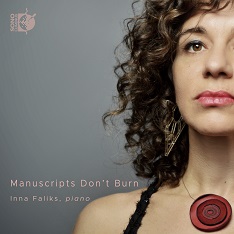Über ihr neues Album sagt die Pianistin Inna Faliks: « Es ist mein bisher persönlichstes Album mit fünf Uraufführungen, die für mich geschrieben wurden und sich auf mein Lieblingsbuch beziehen, Mikhail Bulgakovs ‘Meister und Margarita’, auf mein ukrainisch-jüdisches Erbe, meine Heimatstadt Odessa und vieles mehr. Diese Sammlung spricht auch meine Liebe zum Dialog zwischen Musik und Wort an. Die Verbindungen zwischen Text und Klang sind hier nicht nur wörtlich zu verstehen, sondern auch emotional, basierend auf Erinnerung, Intuition, Träumen und Hoffnungen. »
Vieles dreht sich um ‘Master and Margarita’, einen russischen Roman über Kunstzensur und Diktatur. Mehrere der Werke des Albums stehen in direktem Zusammenhang mit diesem Buch, darunter, selbstverständlich, die ausdrucksvolle, pianistisch noch recht konventionelle Suite Master and Margarita von Veronika Krausas, aber auch Maya Miro Johnsons Manuscripts Don’t Burn (eine wichtige Zeile im Buch). Das Stück ist experimenteller als die übrigen Kompositionen.
Clarice Assads Godai benutzt einen Text von Steve Schroeder für eine fünfteilige Suite über die fünf Elemente (die im japanischen Buddhismus Godai genannt werden). Die Musik scheint auf Ravel und Debussy zurückzugehen. Die Pianistin gelingt es, die Stücke, in denen sie spielt und spricht, ausdrucksvoll wiederzugeben.
Eine der stärksten Kompositionen ist Ljova Zhurbins Voices (3 Sätze für Klavier und historische Aufnahmen). Das erste Stück ist Sirota, und die historische Aufnahme bringt die phänomenale Tenorstimme des ukrainischen Kantors Gershon Sirota aus dem Jahre 1908 zu Gehör.
The Alter(ed) Zhok bezieht sich auf einen Volkstanz und verwendet eine
Aufnahme, die 1912 im ukrainischen Skvira gemacht wurde. Fraydele erinnert an die jiddische Schauspielerin und Sängerin Fraydele Oysher. Die Aufnahme von 1953 stellt sie mit dem Gebet Ov-Harachamim vor, das im 12. Jahrhundert geschrieben wurde und an die Zerstörung der aschkenasischen Gemeinden rund um den Rhein durch christliche Kreuzfahrer während des Ersten Kreuzzuges erinnert. Ljova Zhurbin ist es gelungen, eine neue Klavierbegleitung zum Gesang von Fraydele Oysher zu komponieren, die diesen unglaublich gut stützt.
Eingebettet in diese bis jetzt erwähnten Werke sind Transkriptionen von Schubert-Liedern durch Franz Liszt, in denen sich Inna Faliks als sehr persönliche und rhythmisch wie phrasierungstechnisch innovative Pianistin zeigt.
Auch für Black Earth von Fazil Say hat Inna Faliks einen eigenen Zugang gefunden, der die effektvolle Musik eine Spur nachdenklicher und mysteriöser werden lässt als in Says eigener Einspielung.
Mike Garsons Psalm to Odesa basiert auf einem bekannten Odessa-Lied und enthält improvisatorische Elemente, die Faliks sehr spontan einbringt.
Unter dem Strich ist dies einerseits ein Album für und aus unserer Zeit, andererseits gibt es der Pianistin Gelegenheit, interpretatorisch markante Zeichen zu setzen.
Pianist Inna Faliks says about her new album: « It is my most personal album yet, with five premieres written for me in celebration of my favorite book, Mikhail Bulgakov’s Master and Margarita, my Ukrainian-
Jewish heritage, my hometown of Odesa, and so much more. This collection of music speaks to my love of dialogue between music and words. The connections between text and sound here are not just literal but emotional, based on memory, intuition, dreams and hopes. »
Much of the music on the album revolves around Master and Margarita, a Russian novel about art censorship and dictatorship. Several of the pieces on the album are directly related to the book, including, of course, Veronika Krausas’ expressive pianistic suite Master and Margarita, which is still quite conventional, but also Maya Miro Johnson’s Manuscripts Don’t Burn (an important line in the book). This piece is more experimental than the others.
Clarice Assad’s Godai uses a text by Steve Schroeder for a five-part suite about the five elements (called Godai in Japanese Buddhism). The music is reminiscent of Ravel and Debussy. The pianist manages to make the pieces, in which she plays and speaks, very expressive.
One of the strongest compositions is Ljova Zhurbins Voices (3 movements for piano and historical recordings). The first piece is Sirota, and the historical recording features the phenomenal tenor voice of Ukrainian cantor Gershon Sirota from 1908.
The Alter(ed) Zhok refers to a folk dance and uses a recording made in 1912 in Skvira (UIkraine). Fraydele recalls the Yiddish actress and singer Fraydele Oysher. On the 1953 recording she sings the prayer Ov-Harachamim, which was written in the 12th century and commemorates the destruction of Ashkenazi communities around the Rhine by Christian crusaders during the First Crusade. Ljova Zhurbin has succeeded in composing a new piano accompaniment to Fraydele Oysher’s song, which supports it incredibly well.
Embedded in these works are transcriptions of Schubert songs by Franz Liszt, in which Inna Faliks shows herself to be a very personal and innovative pianist, both in terms of rhythm and phrasing.
Inna Faliks has also found her own approach to Fazil Say’s Black Earth, which makes the effective music a little more thoughtful and mysterious than in Say’s own recording.
Mike Garson’s Psalm to Odessa is based on a well-known Odessa song and contains improvisational elements that Faliks introduces very spontaneously.
The bottom line is that this is an album for and of our time. On the other hand, it gives the pianist the opportunity to make her mark in terms of interpretation.





















